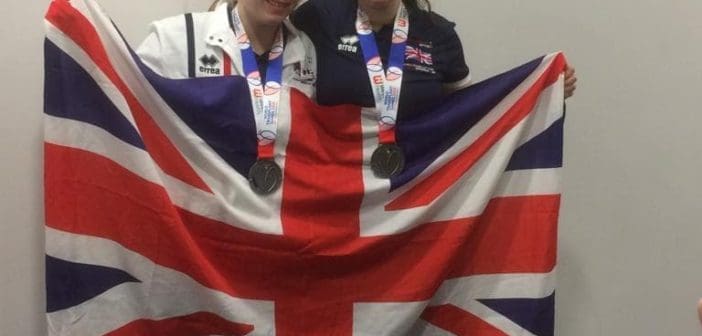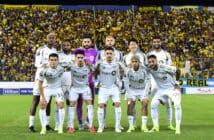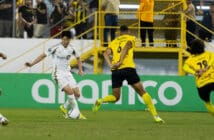“It was lucky. I could save time. Instead of waiting months, or even years, my Dad gave me his kidney. He never lets me forget it!”
Zoe Buchanan and Lucy Young strike you first as your typical young adult. Full of energy, full of positivity, and full of chemistry.
Two young people with two very special stories.
Lucy Young, a native to the Forest of Dean and birthed to Charlotte and Simon, had little to no time to adjust to life before her transplant. At the age of four she was diagnosed with kidney disease, with her aforementioned father providing the kidney which saved his daughters life at the age of eleven.

Zoe Buchanan – Kidney Transplant
Zoe, of Scottish origin and currently living in the Shetlands, had to wait until the age of 12 for her transplant. So as she had acclimatised to conscious thought a lot more than her partner, it may have had an even larger impact and change on an already hectic sporting life.
And since, after meeting in 2013, have gone on to become World Transplant Games Badminton silver medallists this year, surpassing all expectation and even featuring on a BBC documentary voiced by Newcastle United legend Alan Shearer.
And all in all, It was a pleasure to talk to them both and to tell what is a fascinating tale.
Q: Firstly, what transplants did you guys have and what impact did that have in early life?
Lucy: “So we both had kidney transplants, Zoe’s was in March 2010, mine was in April 2010, in different hospitals I may point out.
“It took us off dialysis which was fantastic and it gave me so much more energy. It gave me a diet change as well, as growing up I couldn’t touch potassium or phosphate so no Bananas or Chocolate!”
Zoe: “During my early years I was heavily involved in county sport. But as soon as it became apparent that I couldn’t compete because of this, it had a strong impact on my mental health.”
“But after having the transplant it’s allowed me to continue where it was left off and be where we are now.”
Q: As Family members both gave you their kidneys, do you then feel a stronger connection to them and how does that make you feel?
L: “The best thing is that I didn’t have to wait. It could’ve been months, years on a waiting list to find a suitable kidney, but Dad stepped in.
“He does like to claim that he has my degree though. And my medals. He reckons that I should feed it cider too, but that’s another subject!”
Z: “My mum was my donor, but it was wholly more complex than it should’ve been, purely because of where I live. The Shetland Isles don’t have the equipment that the south do.”
“So after having to travel south, I actually had to end up staying in Glasgow for 18 months. Lucy’s was a similar build-up but obviously Bristol isn’t as logistically complicated.”
Q: When you first had your transplant was there ever a feeling of giving up, or was there always that drive that you would go on to achieve what you have done?
Z: “I made a speech one night when we were fundraising to go to South Africa. My mum said to me right before my transplant, ‘Is there three things you wanna do from this opportunity your getting?’. That’s how we played it, we didn’t treat it like a gift which it obviously was, we used it as an opportunity to lead on to new events.
“I said I wanted to be part of an Olympics, which I did by carrying the Olympic torch. Yes, not like being part of the team but it was a massive honour.
“I wanted to represent Scotland, and I said I wanted to represent Great Britain. I’ve done all three.”
L: “Well personally I was never sporty until around two or three years ago. I just wasn’t interested in competitive sport at all.
“I think the transplant would have been a part of that because as a young person I struggled with pretty much anything.
“But because I was so young when I was diagnosed with the disease, it became the norm. I was used to it. It would be different for Zoe because she was 12, and had a lot more conscious thought at the time.
Q: What got you both into Badminton in particular, and how did it come about?
Z: “My granny was Scottish champion, and she first introduced me to it at the age of seven. It runs in the family for sure.”
L: “For me it’s a little less simple, but after seeing it at the games I thought I’d take it up at uni. She then needed a partner so I stepped up the training a little bit!
“No word of a lie we used to call when I was training and she used to bark at me from the side-lines! She was intense!”
Q: Excellent. So moving on, when was your first transplant games and how did it fee it to represent your regions and countries?
L: “Well our first worlds was this one, and ordinarily we just compete in the British games. My first was in Kent in 2012, where I was part of a tiny team representing Bristol Kids hospital.
“I don’t actually remember how it came about, I just suddenly turned up. I think I was recommended it by one of my nurses. I know they recommend it for rehab, getting to know others who are in very similar situations as Bristol kids is such a tiny culture.”
Z: “My first British Games were in Belfast in 2011, and my first worlds were in Durban, South Africa in 2013.
“The games were introduced to me as a way of getting back into sport, as I was very athletic and sporty before my transplant. However now I have to be on the medication to keep the transplant going, I’m no longer allowed to compete at Olympic or Commonwealth level which was always a goal of mine.
“I was training at the age of 11 at Commonwealth standard but with this medication I needed to be on, it was a matter of staying alive. These games came along as a sort of compromise for me.”
Q: What happened on your first British games? Obviously they came at different times, but did they get different results?
L: “Absolutely they were different! I never went for sport, only for the social side of it where I could meet new people. SHUT UP YOU! (After brief interruption from the family dog, we continued.)
Z: “Please put that in!”
L: “Anyway, they used to do patient weekends and that’s how I got in. Bristol had a very small team, we’re talking five or six kids here. Birmingham had around fifty.
Z: “At the opening ceremony for the games in Belfast in 2011, I just turned around to my Mum and Step-Dad and just started crying.
“They asked why, and I said; ‘For the first time in my life, everybody in this room understands what I’ve been through’. I’m not usually that person who stands there and cries but I just had to.”
“I’ve been to eight British games and three world games now, but any time I see anyone that reminds me of then I just burst into tears.”
Q: What were the expectations this year heading into your first world games together?
L: “Erm, there were none! I was just going because I thought I was never going to get the opportunity again. Purely for term times and trying to get it out of Uni but she had other ideas! You were the driving force, weren’t you coach?
Z: “Absolutely. All that work on FaceTime was worth the while!”
Q: And during the competition, did you ever think you would get as far as you did?
L: “Well we finished second in the group stage, so we were thrilled we could medal anyway. In the Semi-Final we were drawn against our main British rivals, so mainly for pride we had to win!
“That was a really tough Semi, we were 1-0 down in sets before clawing back the second set 15-13. And then the third was around that score again so it was really tight.
“You’d rather have played someone other than a British pair but it was a good match to be involved in.”
Q: And in the final obviously it didn’t quite happen, take me through your rollercoaster of emotions:
L: We’d only been given a five minute break between semi and final, so we were both absolutely knackered. The other pairing had it considerably easier, but no excuses!
“We used the excuse of physio for Zoe to just take a breath. We’d already played the Thai pair before, they’d beaten us in the group stages, so I think we had the mentality of Deja vu.
“We went ahead but that was a miracle to be honest. They were both Thai and Asian champions so obviously they knew what they were doing.”
“At the end they just broke down into tears, so we didn’t feel as bad.”
Z: “As Lucy said, both matches were so hard fought. I’m heartbroken if I’m absolutely honest because we did lose 2-1 and the score overall was incredibly close. I’d just won silver the day before in singles, so I’d already been pretty close, and I thought we might have been able to do it but unfortunately it just wasn’t to be.
Q: So obviously you knew it was going on the BBC. What were your feelings when you first knew about that? Was there any reluctance?
Z: “I was told there was an opportunity, and that Lucy and I had been selected from all the athletes to follow because our story was inspirational, and about how the games brought us together romantically too was…cute.
“Sickly I know! But they thought it showed the benefits of transplantation because without it, we wouldn’t have met. They said that would be a great way to do it, then I was just told about it.”
L: “So initially we had phone interviews with the BBC around January time, then they came to follow us at training, in the gym, in the British Games and in the World Games. We know them pretty well!
“To be fair they filmed us, pestered us and our families and friends, but we got around three minutes of air time and they filmed around six or seven hours worth of stuff!”
Q: Do you think they portrayed your story right? Or were there bits missing from the jigsaw that should’ve been included?
L: “I think they should’ve included where Zoe was from because that was a massive part of her story. She is from another galaxy!”
Z: “All of the games are self-funded, and it costs me around £400 just to get off the island. That’s just to Aberdeen, and that’s a ferry for 14 hours. Its not just a case of jumping on the train. I then have to travel all the way down as south as it is.”
L: “They didn’t include any other reasons on why we had transplants, but barring that I think they did a good job with 3 minutes of footage.”
Q: Finally, where do you both see yourselves in the coming years? Will the transplant games still be a part of your lives?
L: Who knows? I’ve still got four years of studying medicine at Uni in North Wales. God knows what Zoe’s going to do.
Z: The plan was to move next summer to support Lucy, and we were both going to go from there. Sadly I’m not too well but hopefully this can still happen. As for Badminton, we’re both going to try as hard as we can to make the British games next year, and I’ll always continue playing. It’s the one thing I’ve always been good at.
“The games have been such a massive part of our lives so we will both keep trying for those, especially the British games. But as for the Worlds in Houston in 2021, they fall next right in Lucy’s key exam time. As for the one after, depending on health, we will probably try to get back on the world stage in the future.”
![Prost International [PINT]](https://prostinternational.com/wp-content/uploads/2021/08/PINTtFontLogoRoboto1536x78.jpg)





